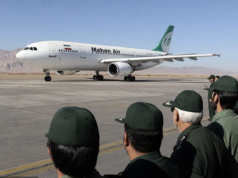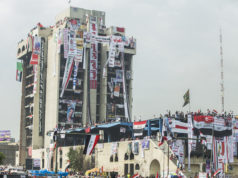Only three months after President Obama officially declared the end of U.S. combat operations in Iraq, leaving less than 50,000 troops in the country to deal with stability operations only, new threats to Iraqi civilians are on the rise.
According to an Associated Press report out Monday, foreign fighters have been slipping back into Iraq in larger numbers since U.S. combat operations ended, and may have been behind some of the most devastating attacks this year, such as the October 31 siege of a church in Baghdad that left 68 people dead. According to a Mideast counterterrorism official, an estimated 250 foreign fighters entered Iraq in October alone. Last year, U.S. officials said the number of foreigners heading to Iraq had trickled from hundreds to “tens.”

Iraqis protest against a government club closure and alcohol ban |
|
The smaller U.S. presence has also seemingly led to a more religious-minded government. Last week, Baghdad began enforcing a Saddam-era ban prohibiting the serving of alcohol in hotels and restaurants. The ban was rescinded five years ago after the American-led invasion toppled the dictator’s government, only to meet a renewed Islam-inspired prohibition campaign this year.
A sign of the changing times, however, Iraqi protesters against the alcohol ban took to the streets last Friday, holding up signs with the phrases “Freedom first” and “Baghdad will not be Kandahar,” a reference to the Taliban fundamentalists’ stronghold in Afghanistan.
Three months into Operation New Dawn and one year before the U.S. military is slated to leave, Iraqis are being forced to face new threats from at home and abroad. While they have shown a willingness to stand up in support of democratic ideals, they must also show their desire to fight for an Iraq free of foreign operatives. Indeed, while the United States can do everything in its power to aid Iraq against insurgents today, only Iraqis themselves will be able to truly secure their nation. Time will tell if they’re up for the challenge.





